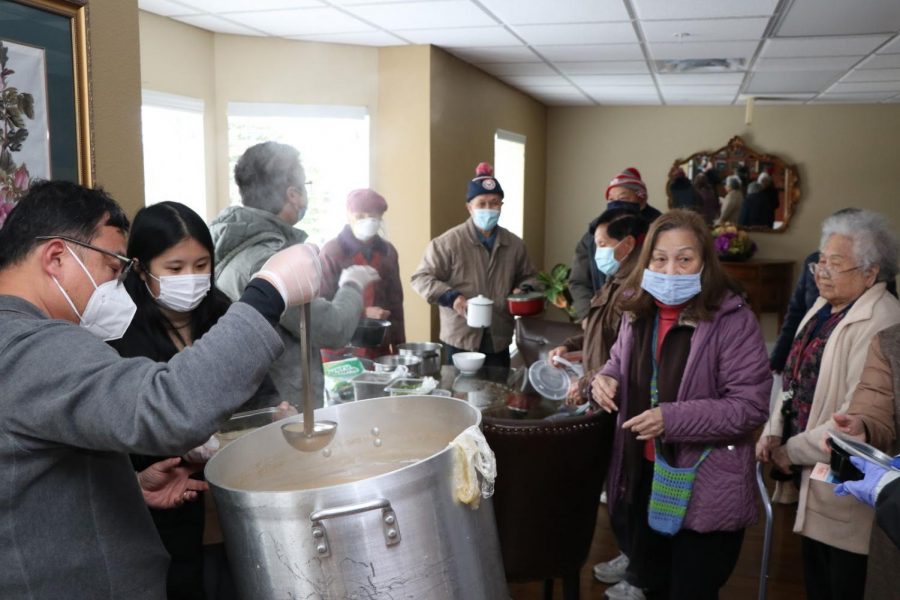Winter Storm in Texas Shocks Hotchkiss Students
Ella Yu ’24 (second to left) and her father (far left) work at a soup kitchen serving elderly citizens after a storm battered Texas and left millions without access to water and hot food.
Imagine sleeping in your car to stay warm because you lost power. For many Texans, this was reality after a winter storm on February 13 stressed the state’s infrastructure, leading to lost power and water for millions.
Many residents were initially ecstatic about the storm and the accompanying snow — a sight rare in the southern state. Ella Yu ’24, who lives in Houston, said, “The streets and rooftop were covered with snow, and everyone came out to take pictures and build snowmen.” By Monday, February 15, temperatures Austin and San Antonio fell below 10 degrees Fahrenheit, the lowest on record in over 30 years.
However, few people anticipated the devastating consequences brought on by the freezing temperatures. “I didn’t think we’d lose water. I expected some power outages, but not on the scale that they occurred,” said Morgan Carr ’21, who lives in Houston.
Pipelines that transport natural gas froze, slashing production rates. Natural gas powers half of the state’s energy grid. As residents across Texas turned up the heat in their homes, the price of gas skyrocketed. This made the problem even worse – operators who use natural gas to create electricity shut off their plants because they were not making a profit.
Other sources of power, such as coal, wind, and nuclear power, also failed in the inclement weather. By February 17, 2.8 million residents did not have electricity. “Every source of power has been compromised,” said Texas Governor Gregg Abbott. A non-profit organization, Electric Reliability Council of Texas (ERCOT), the state’s grid operator, attempted to implement rolling blackouts, which would rotate power availability to different areas in 45-minute intervals.
Instead, some Texans lost power for days on end. Yu’s family, who lost power for 48 hours, said, “The first night without power and heat was extremely cold. [Even with] multiple layers of clothing and two thick comforters, we could hardly sleep. The next morning was even worse. It was about thirty degrees in the house, and we wore thick jackets, gloves, and scarves to help warm us up.”
Carr, who had spotty access to power for four days, says her family was on edge. “Everyone was feeling anxious during this time; we weren’t sure when we would get power and for how long,” she said. Even though Maxwell Gathuru ’24 from Arlington never lost power, he felt the same way. He said, “At any moment, we could be the next ones to lose power.”
Even though the blackouts left Yu and almost five million Texans without power, ERCOT says they were necessary to prevent a much longer-lasting state-wide blackout. “[The grid was] four minutes and 37 seconds away from a total collapse,” ERCOT officials explained in a hearing before the company’s board. It would take weeks to recover from such an event, unlike the few days it took to restore power to a majority of the state.
The energy industry in Texas is deregulated, which means that private companies compete with each other to sell and distribute power to citizens. When former governor George W. Bush signed the bill to deregulate the market, he promised it would “[reduce] monthly rates and [offer] consumers more choices about the power they use.” While the move did dramatically lower the cost of electricity for Texans, it also encouraged energy companies to pursue cost-cutting measures in a market full of competition. Because freezing temperatures virtually never occur in the state, energy producers made little efforts to winterize the infrastructure.
The woes with electricity did not stop there: citizens who engage in the risky practice of purchasing electricity at the market, or wholesale price, were charged extraordinarily high bills when demand for electricity peaked and prices skyrocketed.
Without power, millions of people were horrified to find that they had lost access to water, too. Texans dripped water from faucets in an attempt to prevent pipes from freezing. This practice created an unsustainably high burden on the pumps that deliver water to residents. Along with the failure of water treatment plants, 276 of the 332 water systems in Texas issued boil-water notices.
Even during the height of the storm, Hotchkiss students worked to stay positive. “I got to spend lots of time with my family, and we played board games to entertain ourselves,” said Carr, whose family also helped neighbors who were less fortunate. “We invited friends who didn’t have water to come over, even just to take a quick shower.”
Yu also assisted her local community. “My father and I worked with a Japanese restaurant to provide free, hot soup and congee to several senior living communities,” she said. “As true Texans, we helped each other out by donating food and water and offering houses for people to stay the night.”
In hindsight, many residents blame state officials for a lack of preparation. “[We] were impacted so hard because of lack of preparation,” Gathuru said, noting that, “these types of storms don’t happen very often.” Yu criticized authorities for the grid failure. “We were utterly shocked – the state government and ERCOT were not at all prepared for the storm. They should be held responsible…and there should be an investigation to find a solution to prevent this from happening again.”
Mr. Abbott, too, rebuked ERCOT and vowed that the “disastrous events” would never occur again. “You deserve answers,” he told citizens. “You will get those answers.”





